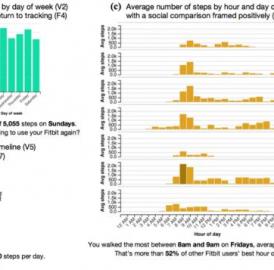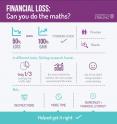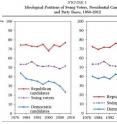Popular Science articles about Psychology & Sociology
Posting personal experiences on social media may help you remember them in the future
A new study -- the first to look at social media's effect on memory -- suggests posting personal experiences on social media makes those events much easier to recall.
Pet therapy can combat homesickness
 The expression dog is man's best friend might have more weight in the case of first-year university students suffering from homesickness, according to a new UBC study.
The expression dog is man's best friend might have more weight in the case of first-year university students suffering from homesickness, according to a new UBC study.
Link between weather and chronic pain is emerging through innovative smartphone research
Preliminary findings from a mass participation study have indicated a link between weather conditions - specifically rain and lack of sunshine - and chronic pain.
Parents' math skills 'rub off' on their children
Parents who excel at math produce children who excel at math. This is according to a recently released University of Pittsburgh study, which shows a distinct transfer of math skills...
The Lancet Psychiatry: Increasing number of US adults using marijuana as fewer people perceive the drug as harmful
An increasing number of US adults are using marijuana, as fewer people perceive the drug as harmful, according to a survey of over 500000 US adults conducted between 2002 and...
US teens more likely to vape for flavorings than nicotine in e-cigarettes
US teens are more likely to vape for the flavourings found in e-cigarettes rather than nicotine, suggests research published online in the journal Tobacco Control.
Chew on this: How we believe our meat is raised can influence how it tastes
Our beliefs about how farm animals are raised can shape our meat-eating experience, according to a new study led by Lisa Feldman Barrett, University Distinguished Professor of Psychology at Northeastern...
Chimpanzees choose cooperation over competition
When given a choice between cooperating or competing, chimpanzees choose to cooperate five times more frequently Yerkes National Primate Research Center researchers have found. This, the researchers say, challenges the...
Why prisons continue to grow, even when crime declines
The U.S. prison population continued to rise even after the crime rate began declining in the mid-1990s because judges were faced with more repeat offenders, a new study suggests.
'I miss you so much': How Twitter is broadening the conversation on death and mourning
Death and mourning were largely considered private matters in the 20th century, with the public remembrances common in previous eras replaced by intimate gatherings behind closed doors in funeral parlors...
Being the primary breadwinner is bad for men's psychological well-being and health
Gendered expectations in marriage are not just bad for women, they are also bad for men, according to a new study by University of Connecticut (UConn) sociologists.
UBC research could help local governments plan together
 A new approach to modelling land use change developed at UBC could help cities and towns better coordinate their land-use planning efforts.
A new approach to modelling land use change developed at UBC could help cities and towns better coordinate their land-use planning efforts.
Personnel selection, training could mitigate effects of cognitive lock-up in automation operators
Automation failures have been the cause of such widely reported disasters as the crash of Air France Flight 447 in 2009, with most of the focus placed on deficiencies in...
Study links autism severity to genetics, ultrasound
For children with autism and a class of genetic disorders, exposure to diagnostic ultrasound in the first trimester of pregnancy is linked to increased autism severity, according to a study...
Dog brains process both what we say and how we say it
 The first study to investigate how dog brains process speech shows
that our best friends in the animal kingdom care about both what we
say and how we say it....
The first study to investigate how dog brains process speech shows
that our best friends in the animal kingdom care about both what we
say and how we say it....
How long do you want to live? Your expectations for old age matter
Why do some people want to live a very long time, while others would prefer to die relatively young? In a latest study, a team of researchers including Vegard Skirbekk,...
Music at work increases cooperation, teamwork
 From casual acoustic melodies at the coffee shop to throbbing
electronic beats at teen clothing outlets, music is used to mold
customer experience and behavior. But what impact does it...
From casual acoustic melodies at the coffee shop to throbbing
electronic beats at teen clothing outlets, music is used to mold
customer experience and behavior. But what impact does it...
Relationships with family members, but not friends, decrease likelihood of death
For older adults, having more or closer family members in one's social network decreases his or her likelihood of death, but having a larger or closer group of friends does...
Is divorce seasonal? UW research shows biannual spike in divorce filings
To everything there is a season -- even divorce, new research from University of Washington sociologists concludes.
Why do they treat me like that? Taking the mask off of envy
You just received the promotion you have worked so hard for, but you overhear a co-worker say that you got it because the boss only gives the easy projects to...
Bartending and family life might not mix, study says
If you want to mix drinks for a living, don't expect to have a typical family life.
More news about Psychology & Sociology
Psychology News in Images
Breaking science news from the newsfeed about Psychology & Sociology
- Researchers find neurological link between religious experiences and epilepsy
- How to super-size your memory, according to science
- Pro-pot arguments fly higher with likely voters
- Poking at consciousness
- Eliza Dushku on her addiction issues: 'Today I'm sober for me'
- Fire in Guatemalan children, teen shelter kills 19
- Lessons in observation
- PTSD risk can be predicted by hormone levels prior to deployment, study says
- A nose for smells? Practice makes perfect
- Town in England proposes 'swearing ban'
- Woodpecker study suggests social living doesn't always require more brain power
- Chrissy Metz says she'd love to appear on 'The Biggest Loser'
- Americans are having sex less often, new study shows
- Ruth Hubbard Wald, 92
- Jay Z to take part in 'town hall' meeting on Kalief Browder case
- Aging in place could save money, benefit health outcomes in public housing for the elderly
- No evidence immigrants displacing U.S. workers
- Sound waves boost older adults' memory, deep sleep
- Justin Trudeau marks International Women's Day with $650M for reproductive rights
- Violent video games found not to affect empathy
- Schools close as female workers stay home for 'A Day Without a Woman'
- Lance Armstrong on dating Sheryl Crow: 'It was a good ride'
- There's no such thing as gender equality if you're a woman in politics
- The Weird Ways Your Politics Affects Your Morals
- Networking project launched to empower girls in science
- After controversy, Uber CEO following through on pledge
- Montreal Canadiens' Tomas Plekanec misses first game in almost 3 years
- New York Rangers rev up attack in 5-2 win over Florida Panthers
- New Study Examines Whether Dogs Are Feline-Friendly - or Not
- San Antonio Spurs' Kawhi Leonard gets his wish with drug test after big game








